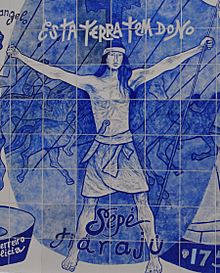Sepé Tiaraju facts for kids
Quick facts for kids Servant of GodSepé Tiaraju |
|
|---|---|

Sepé Tiaraju by Danúbio Gonçalves
|
|
| Layman and Guarani Leader | |
| Born | c. 1723 São Luiz Gonzaga, Rio Grande do Sul, Brazil |
| Died | 7 February 1756 São Gabriel, Rio Grande do Sul, Brazil |
| Venerated in | Roman Catholic Church Folk Catholicism Anglicanism |
| Patronage | Diocese of Bagé |
Sepé Tiaraju (born around 1723, died 1756) was an important leader of the Guaraní people. He lived in a Jesuit mission called São Luiz Gonzaga. He died on February 7, 1756, in what is now São Gabriel, Brazil.
Contents
Sepé Tiaraju's Story
Sepé Tiaraju led his people in a big fight. This fight was against the Portuguese and Spanish rulers. It was called the Guarani War. He died just three days before a terrible event. About 1,500 of his friends and fellow soldiers were killed. Even after more than 250 years, Sepé Tiaraju is still a hero. Many people see him as a saint.
Why the Guarani War Started
This conflict happened in South America. It began because European countries decided to divide the land. They signed a paper called the Treaty of Madrid in 1750. This treaty said that the Guarani people living in the Jesuit missions had to leave their homes.
The Guarani had lived in these missions for 150 years. They had a special way of life together. They did not want to go back to the forests. They also did not want to move to another place. Later agreements, like the San Ildefonso Treaty (1777) and the Badajoz Treaty (1801), still dealt with these land issues.
Life in the Jesuit Missions
The Christianized Guarani people lived in Jesuit missions. These missions were in Brazil, Paraguay, and Argentina. About 80,000 Guarani lived there when the war started. These "evangelized" Guarani were different from those living traditionally.
The Guarani in the missions had many cattle. They had what was believed to be the largest herd in all of Latin America. So, the European rulers wanted more than just land. They also wanted the cattle and other resources.
Sepé Tiaraju's Legacy
Sepé Tiaraju became famous in books and poems. A Brazilian writer named Basílio da Gama wrote about him. This was in an epic poem called O Uraguai (1769). He also appeared in "O Lunar de Sepé" by Simões Lopes Neto. This poem was published in the early 1900s.
Sepé Tiaraju is also a character in other important books. One example is "O tempo e o vento" by Erico Verissimo. A famous saying is linked to Sepé Tiaraju. It is "Esta terra tem dono!" In Guarani, it is "Co ivi oguerecó iara." This means "This land has owners!"
Places Named After Sepé Tiaraju
The Sepé Tiaraju Airport is named after him. It is in Santo Ângelo, Rio Grande do Sul, Brazil.
He is also honored by the Anglican Church in Brazil. He was added to their Saints' Calendar in 2015.
See also
- India Juliana
- Nheçu
- Roque González de Santa Cruz
- Tiarajudens
 In Spanish: Sepé Tiarayú para niños
In Spanish: Sepé Tiarayú para niños
 | Mary Eliza Mahoney |
 | Susie King Taylor |
 | Ida Gray |
 | Eliza Ann Grier |

